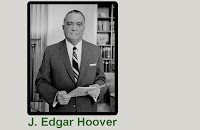On May 1924, Calvin Coolidge, the President of the U.S., and his Attorney General, tried to clean up the Justice Dept. and ordered the FBI to limit investigations to those who violate the law. This was the first time a high government official acknowledged that illegal surveillance constituted a threat to our democratic liberties. Despite these orders, J. Edgar Hoover, the first Director of the FBI, regularly allowed wiretapping and other illegal means of gathering evidence and hired informers who spied on several lawful political activities.
FBI Files (Freedom of Information Act)-
FBI files obtained through the Freedom of Information Act show that, although FBI Director, J. Edgar Hoover appeared to implement Attorney General Stone's policy, he continued to gather information on certain groups such as radical political and labor organizations. He risked having one of his agents blow the whistle and expose his illegal FBI surveillance.
FBI's Secret List-
Like Coolidge, President Franklin Delano Roosevelt allowed the FBI to have a limited role in investigating "subversive activities." Only after Hitler invaded Poland in September 1939, the president reluctantly authorized the FBI to resume political surveillance. In 1940, FBI Director J. Edgar Hoover compiled a secret list of people he considered to be potentially dangerous to the U.S.
National Security Crisis-
In a time of national security crisis, the people on the FBI Director's "Security Index" or Secret List would be detained without obtaining a warrant.
Disobedient FBI -
In 1943, an order to destroy the FBI Director's secret list of names fell on deaf ears.
J. Edgar Hoover's Accomplishments-
J. Edgar Hoover was instrumental in founding the Federal Bureau of Investigation in 1935 and formed a large and efficient crime-fighting agency. He established a centralized fingerprint file, forensic laboratories and training for the police.


